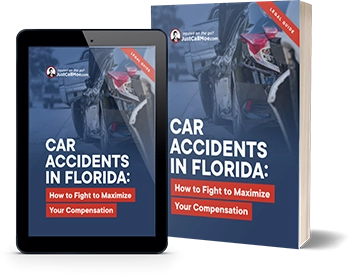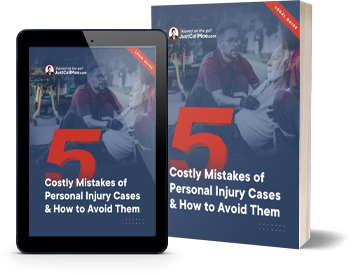Being involved in a car accident is devastating. However, if the crash resulted from another driver’s negligence, you have the legal right to file a personal injury claim to recover your damages. Understanding the steps involved in the personal injury claim process can boost your chances of obtaining a full settlement.
Florida has a few nuances governing car accident claims, so it’s crucial to know the policies that apply to your specific case. While the claims process in the Sunshine State is profoundly similar to other states, there are several variations that may warrant the need to partner with a personal injury lawyer. Contact JustCallMoe in Florida to speak with a lawyer about starting your injury claim after a car accident.
Important Things to Know About Florida’s Personal Injury Claim Process
- Florida is among the 12 states in the US that have no-fault laws. That means that the courts don’t get involved in car accident cases unless there are catastrophic injuries or reported fatalities – the more reason to seek the services of a personal injury lawyer.
- Since Florida is a no-fault state, every driver must obtain Personal Injury Protection Insurance (PIP) with a minimum of $10,000 in coverage and a $10,000 coverage limit for Property Damage Liability (PDL).
The Personal Injury Claim Process in Florida: Step by Step
The following is the step-by-step process of filing a personal injury claim in Florida:
Contact a personal injury attorney
Once you’ve contacted your doctor and received treatment, hire an experienced personal injury lawyer to offer legal counsel and guidance on preparing claims documents and filing your claim. Take the offer to have an initial consultation for free from a lawyer who provides legal services on a contingency basis. This means they only get paid once you’ve received your full settlement.
While undergoing treatment, ensure you safely keep any records of the accident. These include police reports, images and videos shot at the accident scene, and other pieces of evidence. Additionally, store copies of financial records and receipts, such as medical bills and payments, documentation regarding lost income/wages, and anything that might help bolster your case.
Your lawyer will highly rely on these records to prepare a solid claim and calculate your economic damages.
Notify your insurance carrier
As previously mentioned, Florida is a no-fault state, and if the courts are not involved in settling car accident claims, the only wise move is to leverage your PIP insurance coverage. Unfortunately, this insurance only covers your injuries up to $10,000; beyond that, your personal health insurance steps in.
You need to notify both your insurer and the defendant’s provider. An upside to retaining an attorney is that they can easily contact both insurers on your behalf.
If you contact the companies, avoid recorded statements at all costs. Remember, insurance carriers are only your friends when you’re paying premiums; they’ll use your recorded statements against you in an attempt to deny your claim. Furthermore, don’t sign any documents until your lawyer has reviewed them.
Draft a demand letter
Your injury lawyer will draft a demand letter and issue it to the car insurance provider. A standard demand letter will typically include details about the case evidence and injury-related information: medical bills, proof of lost income, any ongoing treatments, and other expenses.
Your lawyer will also demand a settlement amount and a timeline within which the insurance company must respond, usually 30 days.
Settlement negotiations
The insurance carrier may express unwillingness to meet the letter’s demands or even decide to play hardball. In worst-case circumstances, they may elect to clear the settlement altogether.
However, if negotiations between your lawyer and the insurance company don’t materialize, the case will proceed to trial, in which case you’ll have to file a lawsuit. It’s best to settle out-of-court than file a lawsuit because a trial comes with its fair share of expenses that nobody would want to incur.
Go to trial
Only a small fraction of personal injury claims (about 2-5%) reach the trial stage. Going to trial means that a judge or jury will be the one passing judgment on the case. You and the defendant have a chance to tell your side of the story.
Your lawyer will present the facts and evidence of the case to convince the judge or jury that the defendant breached the duty of care to you and that’s what caused the accident and resulting injuries.
After listening to the motions and arguments from both sides, the judge or jury passes the final judgment on whether you deserve the settlement.
How Long Does a Personal Injury Settlement or Trial Take in Florida?
It’s difficult to tell exactly how long reaching an injury settlement will take because every case is unique – each fact pattern, party, and injury varies from case to case, even if slightly.
Typically, the claim process timeline depends on several factors, including:
- The complexity of the case
- The amount of damages
- The caseload in the courts
- The severity of injuries
- Your patience
- The defendant’s willingness to settle
You can only know how long your settlement will take once the case is closed. Some cases take a few weeks, while others take years to settle.
Awarding Your Settlement
It’s understandable to be concerned about how long it will take to finally obtain the settlement check.
Once the claimant and the defendant agree to a settlement amount, they sign the settlement agreement. The plaintiff (claimant) must also sign the documentation to give up the right to take any legal action (pertaining to the case) in the future. At that juncture, your claim is almost finalized, and you’ll receive your settlement. Nonetheless, it will take about four to six weeks to finally obtain your check.
After both parties sign the settlement release, the document is sent to the insurance provider. The company then reviews it, closes the claim, and sends a check to your personal injury attorney. Upon receipt, your lawyer will place the proceeds into escrow so that any claims against the settlement – such as a doctor’s lien, a mechanic’s lien, a workers’ compensation lien, etc. – are settled.
Afterwards, the attorney will deduct their service fee from the compensatory amount and send you the final check. As mentioned above, it’ll take about four to six weeks to finally get your settlement check after the release is signed and the insurer agrees to settle.
Get Legal Help with Your Claim Process with JustCallMoe Personal Injury Lawyers
At JustCallMoe, we are a dedicated law firm with knowledgeable and experienced attorneys who understand Florida’s litigation laws and the unpredictable claims process. We provide personalized legal advice and representation with compassion and empathy, and we’ll ensure you file your claim in time to present a valid case.
We are here when you need us the most; contact JustCallMoe in Orlando, FL, to schedule an appointment.
FAQs about Personal Injury Claim Process
How soon should I seek medical treatment after a car accident?
Ideally, it would be best to see a professional doctor immediately after an accident, but a settlement can be won for clients who have waited a while until their situation settles down. Usually, people wait to assess if the pain will go away or increase, but that is not reason enough to be punished or get frustrated with insurance claims.
Can I still pursue a claim for a hit and run accident?
A hit and run situation means the at-fault driver has fled and can’t be identified. In that case, you can recover your damages under Florida’s uninsured/underinsured motorist (UM) policies. UM insurance is an optional coverage that enables you to recover damages because the state considers the unidentified driver uninsured or underinsured.

 (866) 225-5663
(866) 225-5663



